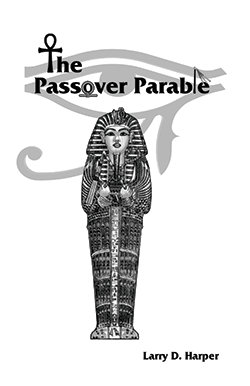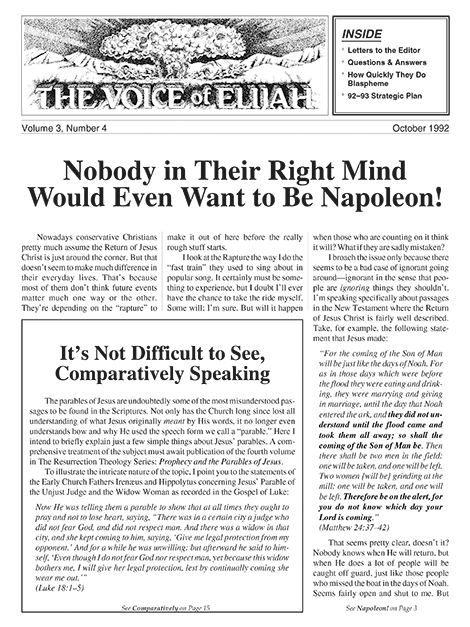The Parables of Jesus Were Used to Conceal the Truth
Jesus spoke in parables for exactly the same reason that Moses and all the other Prophets of Israel spoke in parables in their prophecies. He was using parabolic images and Hebrew idioms to conceal and reveal how His birth, life, death, and Resurrection were like a variety of things in the known physical realm.
Believe it or not, God told all the Prophets of Israel—from Moses to Malachi—to conceal the Word of God in parables and other hard-to-understand sayings. The Prophet Hosea specifically states that God spoke through His Prophets using parables:
I have also spoken to the prophets,
And I gave numerous visions;
And through the prophets I gave parables.
(Hosea 12:10) —NASB
What God said to the Prophet Ezekiel provides additional evidence of the fact that the Prophets of Israel spoke in parables:
Now the word of the Lord came to me saying, “Son of man, propound a riddle, and speak a parable to the house of Israel.”
(Ezekiel 17:1–2) —NASB
“And speak a parable to the rebellious house, and say to them, ‘Thus says the Lord God.’”
(Ezekiel 24:3a) —NASB
In addition to this evidence, the Hebrew word for parable (mashal) is also translated “proverb” in the Old Testament. Therefore, a proverb is the same as a parable, which means the Book of “Proverbs” is actually a book of parables (comparisons). That explains why the author of the Book of Proverbs describes his reason for writing this way:
To know wisdom and instruction,
To discern the sayings of understanding,
To receive instruction in wise behavior,
Righteousness, justice and equity;
To give prudence to the naive,
To the youth knowledge and discretion,
A wise man will hear and increase in learning,
And a man of understanding will acquire wise counsel,
To understand a proverb and a figure,
The words of the wise and their riddles.
(Proverbs 1:2–6) —NASB
Ultimately, all of the parables and hard-to-understand statements of Jesus Christ are tied directly to the parabolic statements—the “proverbs” and “riddles”—behind which Moses and all the other Prophets of Israel concealed the Truth of the Word of God. Matthew makes this point by tying Psalm 78:2 directly to what Jesus was doing when He spoke in parables:
I will open My mouth in a parable;
I will utter dark sayings of old,
Which we have heard and known,
And our fathers have told us.
(Psalm 78:2–3) —NASB
All these things Jesus spoke to the multitudes in parables, and He did not speak to them without a parable, so that what was spoken through the prophet might be fulfilled, saying,
“I will open my mouth in parables;
I will utter things hidden since the foundation of the world.”
(Matthew 13:34–35) —NASB
People today do not understand the meaning and significance of what Jesus Christ spoke in parables because they do not know He spoke in parables to conceal and reveal the mysterious “dark sayings” or “hidden things” that Moses and all the other Prophets of Israel used to both conceal and reveal the meaning and significance of their parables. Like the Prophets of Israel before Him, Jesus spoke in parables during His public discourses to conceal the Truth of the Word of God from the multitudes. Yet He revealed the meaning and significance of His parables to His disciples in private:
And with many such parables He was speaking the word to them as they were able to hear it; and He did not speak to them without a parable; but He was explaining everything privately to His own disciples.
(Mark 4:33–34) —NASB
Related Information

The Passover Parable
Jesus said the writings of Moses, the Prophets, and the Psalms—that is, the entirety of the Hebrew Scriptures—are all about Him (Luke 24:27, 44; John 5:46). Yet few today can find any reference to Jesus Christ in the Hebrew Scriptures because they don’t understand that God has used parables since the time of Moses to speak concerning His Son. The Passover Parable is at the heart of God’s message concerning His Firstborn Son, Jesus Christ. That message can be seen in the carefully orchestrated parabolic pantomime that God directed Corporate Israel, His Firstborn Son (Ex. 4:22), to enact during the Exodus of the sons of Israel from Egypt.

Nobody in Their Right Mind Would Even Want to Be Napoleon!
It is generally accepted that a perfectly rational person is one whose state of mind accurately reflects his state of being. The deluded fellow who believes he is Jesus Christ is generally accepted as being insane. Where does that leave all those people today who believe Satan’s lies? They insist everyone—themselves above all—is special to God (their deluded state of mind). Like a totally paranoid individual, they reject the Truth about their wretched spiritual condition (their actual state of being). This article makes the point that sanity, above all else, requires a knowledge of and belief in the Truth rather than a fantasy.

If You Plan to Reap What You Sow, You Had Better Watch What You Plant
This is the first in a series of articles that explain the meaning of Jesus’ parables in terms of the parabolic imagery and Hebrew idioms the Prophets used. It continues the undertaking begun in the “Questions & Answers” column of the January 1998 issue. It explains what Jesus was talking about in the Parable of the Sower and how that relates to the fact that He is Corporate Israel—in and of Himself the Kingdom of God.

Glory Be! What’s That I See?
This is the third in a series of articles that explain the meaning of Jesus’ parables in terms of the parabolic imagery and Hebrew idioms the Prophets used. The first two articles appeared in the April and October 1998 issues. This article investigates the parabolic imagery the Prophets use to describe God’s “harvest” at the End of the Age.
The Truth is Available
Check Out the Online Library
Browse through our library of eBooks and newsletters—absolutely free!
Start Reading Now